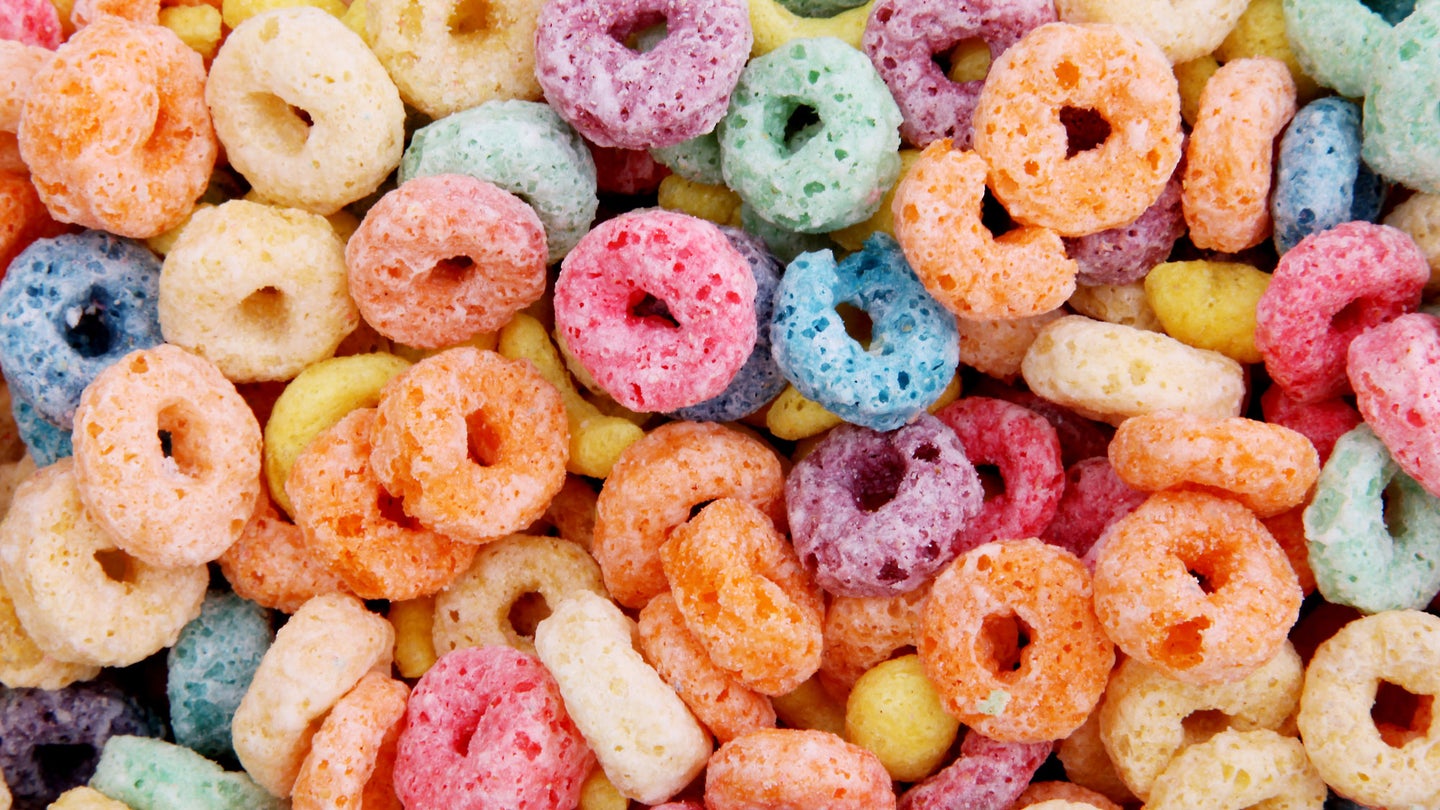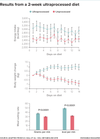Researchers are figuring out the features of these foods that harm our health—and proposing ways ahead.
By
Alice Callahan/Knowable Magazine
|
Published Jan 31, 2024 12:30 PM EST

Industrially processed foodstuffs that are engineered to be highly palatable are doing our health no good, researchers say. DepositPhotos
This article was originally featured on Knowable Magazine.
From breakfast cereals and protein bars to flavored yogurt and frozen pizzas, ultraprocessed foods are everywhere, filling aisle upon aisle at the supermarket. Fully 58 percent of the calories consumed by adults and 67 percent of those consumed by children in the United States are made up of these highly palatable foodstuffs with their highly manipulated ingredients.
And ultraprocessed foods are not just filling our plates; they’re also taking up more and more space in global conversations about public health and nutrition. In the last decade or so, researchers have ramped up efforts to define ultraprocessed foods and to probe how their consumption correlates to health: A wave of recent studies have linked the foods to heightened risk for conditions ranging from cardiovascular disease and cancer to obesity and depression.
Still, some researchers—and perhaps unsurprisingly, industry representatives—question the strength of the evidence against ultraprocessed foods. The category is too poorly defined and the studies too circumstantial, they say. Plus, labeling such a large portion of our grocery carts as unhealthy ignores the benefits of industrial food processing in making food affordable, safe from foodborne pathogens, easy to prepare and in some cases more sustainable—such as through the development of plant-derived products designed to replace meat and milk.
“You cannot throw the baby out with the bathwater and decide that you’re going to just dump everything” that’s ultraprocessed, says Ciarán Forde, a sensory science and eating behavior researcher at Wageningen University in the Netherlands and coauthor of a 2022 look at food processing and diets in the Annual Review of Nutrition.
As the debate about ultraprocessed foods roils on, one path forward is to invest in understanding the mechanisms by which ultraprocessed foods affect health. If the foods are indeed harmful, what about them—what features?—makes them so, and why? Through feeding volunteers carefully formulated diets and watching their consumption behavior, researchers can identify the qualities that make these foods both so appealing and so unhealthful, they say. Such studies could help to pinpoint the most harmful types of ultraprocessed foods—ones that might be targeted with warning labels and other policies—and guide companies in tweaking their recipes to produce more healthful options.
“I think the biological mechanisms are really important both to strengthen the evidence, but also to find solutions,” says Filippa Juul, a nutritional epidemiologist at New York University. That said, Juul adds, she thinks there’s already enough evidence about the harms of ultraprocessed foods to recommend that people eat less of them.
Sifting the evidence on ultraprocessed foods
To study ultraprocessed foods, researchers must be able to define them, and even this is contentious. Food preparation involves processes like grinding, cooking, fermenting and pasteurizing — methods that have long been used to make foods safer and more digestible, palatable and storable. But according to the most widely used classification system, called NOVA, ultraprocessed foods are distinguished by additional industrial techniques, like hydrolysis, hydrogenation and extrusion, and with ingredients like emulsifiers, thickeners, flavors and other additives that are rarely found in home kitchens.
 Lots of foods are processed to some degree—think canning and bottling or the use of preservatives and antioxidants. But ultraprocessed foods are manipulated far beyond that. Here are the attributes of ultraprocessed foods according to NOVA, a broadly used food classification system developed by researchers at the University of Sao Paulo, Brazil. Credit: Knowable Magazine
Lots of foods are processed to some degree—think canning and bottling or the use of preservatives and antioxidants. But ultraprocessed foods are manipulated far beyond that. Here are the attributes of ultraprocessed foods according to NOVA, a broadly used food classification system developed by researchers at the University of Sao Paulo, Brazil. Credit: Knowable Magazine
Most of the evidence that ultraprocessed foods are harmful comes from observational studies in which participants are asked about the foods they eat and have their health tracked over time. These studies have consistently found that people who ate more ultraprocessed foods were more likely to develop cardiovascular disease, high blood pressure, type 2 diabetes, some types of cancer, obesity, depression and inflammatory diseases of the gastrointestinal tract such as Crohn’s disease, as well as to die during the course of the studies.
Such observational studies can’t prove that ultraprocessed foods caused these health problems, in part because other factors in people’s lives could account for their greater risk of illness and death, Juul says. In the United States, for example, people who eat more ultraprocessed foods also tend to have lower incomes and education levels and to live in poorer neighborhoods; and unmeasured factors such as stress, sleep and exposure to racism and weight bias could confound the correlation between food processing and health.
However, Juul adds, the association between ultraprocessed foods and poor health is remarkably consistent in research from around the world. And though ultraprocessed foods often have poor nutritional profiles—containing more sugar, sodium and saturated fat than their minimally processed counterparts—that’s not the whole story: Studies that have adjusted for differences in nutritional quality have found an association of similar magnitude remains. “There seems to be something else about these foods; it’s not just about the nutrients,” Juul says.
Unlike observational studies, randomized controlled trials can provide direct evidence that a particular diet causes health issues, but so far, only one short-term trial of this type has been published. In the tightly controlled study, led by National Institutes of Health nutrition and metabolism scientist Kevin Hall and published in 2019, 20 participants lived at a clinical center for one month and were offered either minimally processed foods or ultraprocessed foods for two weeks, then the other for two weeks. The meals were matched for overall calories, carbohydrates, sugar, fiber, fat, protein and salt, and participants were told they could eat as much or as little as they liked.
During two weeks on the ultraprocessed diet, participants ate an average of 508 more calories per day and gained about two pounds, the study found; during two weeks on the minimally processed diet, they lost about the same amount.
 Participants in a 28-day trial comparing ultraprocessed and unprocessed diets consumed more calories during the two-week ultraprocessed portion of their regimen. The ultraprocessed diet was also associated with weight gain and a faster eating rate. Credit: Knowable Magazine
Participants in a 28-day trial comparing ultraprocessed and unprocessed diets consumed more calories during the two-week ultraprocessed portion of their regimen. The ultraprocessed diet was also associated with weight gain and a faster eating rate. Credit: Knowable Magazine
That result was surprising to Hall, who had predicted that the level of processing wouldn’t matter since the two diets had similar nutrient levels. It also raised new questions: What is it about ultraprocessed foods that makes us eat more? And do all ultraprocessed foods have similar effects on us? The answer to the second question is probably not, Hall says. For example, in a 2023 study, overall intake of ultraprocessed food correlated with a greater risk of type 2 diabetes, but some food types—including cereals, whole grain breads, yogurt and dairy-based desserts like ice cream—were linked with a lower risk.
Hall says it will take a lot more research to figure out which subcategories of ultraprocessed foods are unhealthy and why; different mechanisms may underlie different maladies. A long list of mechanisms could contribute, adds Juul—such as food additives that affect the microbiome; the foods’ rapid and easy digestibility; chemicals absorbed from packaging; or the displacement of healthy foods from the diet. “It’s likely a combination of all of these things,” she says.
Why do we eat more ultraprocessed foods?
If people outside of lab settings eat about 500 extra calories per day on an ultraprocessed diet, as they did in Hall’s 2019 study, it could help to explain why obesity rates have grown in recent decades, he believes. Hall is now focused on understanding why ultraprocessed foods would drive us to do this.
One possible explanation is energy density, or the number of calories per gram of food. In Hall’s 2019 NIH trial, for example, energy density was higher for the ultraprocessed foods, primarily because they contained less water, than for the minimally processed foods. Previous research has shown that people tend to consume more calories when they eat energy-dense foods, perhaps because the foods are less physically filling to the gastrointestinal tract and allow for more calories to be consumed in a shorter amount of time, interfering with normal satiety signaling. When Hall and colleagues looked back at 2,733 meals served in two NIH trials comparing different types of diets, they found that energy density was one of the most important determinants of calorie intake within a given meal.
Hall and colleagues also saw in the study that participants ate more when they were offered foods containing greater amounts of certain pairs of nutrients — fat and sugar, fat and sodium, or carbohydrates and sodium — than are found in nature, or in whole foods. Such foods are “hyperpalatable,” explains Tera Fazzino, a behavioral psychologist at the University of Kansas who defined the term. Hyperpalatable foods have been shown in animal and human studies to excessively activate reward-sensing circuits in the brain, and it’s more difficult to stop eating them, she says.
That’s different from the way we enjoy other foods, Fazzino adds. An apple, for example, contains naturally occurring sugars that make it pleasant to eat, but it’s not hyperpalatable because it doesn’t also contain lots of fat. In a similar manner, many of the foods that Fazzino enjoys when she visits family in Italy, such as fish lightly seasoned with olive oil and salt, and biscotti made with butter and a touch of sugar, leave her feeling perfectly satisfied, she says.
In contrast, it can feel like an act of resistance to stop eating hyperpalatable foods, such as the many packaged snack foods formulated with tasty combinations of carbohydrate, fat and salt, Fazzino says. And that’s a worry, because Fazzino’s research indicates that the prevalence of hyperpalatable foods in the US increased from 49 percent in 1988 to 69 percent in 2018.
At the NIH, Hall is currently running another clinical trial to try to tease apart the contributions of energy density and hyperpalatability to how much food people eat. In this study, participants will try four different diets, all matched for nutrient levels, for one week each. One is minimally processed. The other three are ultraprocessed, and either dense in calories or hyperpalatable, or both.
 Researchers want to know what qualities make some ultraprocessed foods so alluring, or “hyperpalatable.” One observed pattern is that the foods are often high in pairs of nutrients—either fat and sodium, fat and sugars, or carbs and sodium. Credit: Knowable Magazine
Researchers want to know what qualities make some ultraprocessed foods so alluring, or “hyperpalatable.” One observed pattern is that the foods are often high in pairs of nutrients—either fat and sodium, fat and sugars, or carbs and sodium. Credit: Knowable Magazine
In the Netherlands, meanwhile, eating behavior researcher Forde is focused on yet another food characteristic to explain greater calorie intake of ultraprocessed foods: texture. Many ultraprocessed foods are “effectively prechewed when they arrive on your plate because they’re softly textured,” Forde says — and that makes them easier to eat more quickly.
Research by Forde and others has found that people eat meals with harder textures more slowly. And in a recent trial, participants consumed 26 percent fewer calories from hard-textured lunches than they did from softly textured ones. Calorie intake was lowest of all when people ate a meal that was both hard-textured and also minimally processed.
Forde’s group is now planning a randomized controlled trial, funded in part by food companies, that will test participants’ intake of two different ultraprocessed diets for two weeks. Forde predicts that people will eat more of the “fast diet” that is soft in texture than the “slow diet,” which has been designed to have harder textures.
Other researchers are looking at ultraprocessed foods from the perspective of addiction biology. Because we can eat these foods quickly, and they often lack much structure or fiber to slow their digestion, they deliver a quick dose of calories and a rewarding spike in the neurotransmitter dopamine to the brain, says Alexandra DiFeliceantonio, a neuroscientist who studies eating behavior at the Fralin Biomedical Research Institute at Virginia Tech Carilion.
In an ongoing study, she and colleagues are giving people calorie-matched, rapidly digested sugar (“fast calories”) or slowly digested sugars with added fiber (“slow calories”) along with previously unfamiliar flavors. DiFeliceantonio hypothesizes that people will develop a stronger preference for the flavors paired with the fast calories. And this, she adds, could help explain why we might struggle to stop eating certain ultraprocessed foods that were “literally engineered to be delicious,” she says.
Regulate? Or reformulate?
DiFeliceantonio hopes that studies like hers will help disentangle what it is about ultraprocessed foods that cause overeating, and support new regulations that lead to more healthful choices. “Then,” she says, “you have a really strong scientific foundation for making changes in the environment, and not just asking people to make changes on an individual level.” Regulations might include limiting how the foods are advertised (for example, not during television shows for children) or requiring neighborhood markets to carry fresh foods in addition to packaged ones.
Some public health experts say that regardless of the mechanisms, we know enough that we should be taking steps to reduce the consumption of ultraprocessed foods right now. “Whether they’re hyperpalatable, whether they’re energy-dense, whatever the cause is, the effect has been huge,” says Barry Popkin, an economist and nutrition epidemiologist at the University of North Carolina at Chapel Hill.
Popkin points to countries that have already imposed regulations and restrictions on certain ultraprocessed foods. Chile, for example, has added warning labels on the front of food packages and taxed sugary drinks; the country has also banned certain foods in schools and restricted their marketing to children — policies associated with a drop in sugary beverage purchases and improved nutritional quality of packaged foods. More than 50 countries, covering about 20 percent of the world’s population, now tax sugary drinks because of their effects on health, and many other countries, including Israel, Canada, Brazil and Mexico, are adding warning labels to unhealthy foods, Popkin says.
Forde worries that such policies will only make food more expensive and slow progress in developing more sustainable foods. It would be more productive, he says, to encourage food companies to leverage their processing technologies to make healthier products. (Forde sits on an advisory council of Kerry Group, a food and ingredient company.) They could use food-processing techniques to reduce the caloric density of foods or incorporate more texture so that people eat a bit slower, he says. “If processing is the problem, processing is also by far the best solution we currently have,” he adds.
Hall would also like to see food scientists work with nutrition scientists to take on this challenge. Take a chicken nugget, for example. By adding a bit of fiber and tweaking the salt and fat content, skilled food scientists might be able to make it less energy-dense and remove its hyperpalatable qualities, he says. Whether people will still want to eat such a nugget remains to be seen.
This article originally appeared in Knowable Magazine, an independent journalistic endeavor from Annual Reviews. Sign up for the newsletter.
>>> Read full article>>>
Copyright for syndicated content belongs to the linked Source : Popular Science – https://www.popsci.com/health/what-can-we-do-about-ultraprocessed-foods/


















